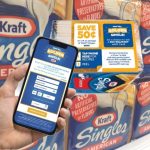
You may get a printed Catalina coupon when checking out, based on what you just bought. Or you might be offered a selection of digital coupons, based on your prior purchases. The coupons may be “just for you” – but you might never actually want or need them.
These are the types of offers that pass for personalized coupons these days. They’re not particularly sophisticated, and not all that “personal”.
So what will it take to get truly personalized coupons, specific to your needs and desires, values and principles, goals and aspirations – and that you’re actually likely to use?
Walmart thinks it has the answer. In a newly-published patent application that runs 50 pages and references everything from Newtonian physics to Euclidean geometry, Walmart describes a personalized coupon system that’s quite complex – and just a little creepy.
“Some vendors distribute coupons based on historic purchases,” the application reads. “However, such mass coupon distributions have very limited success in actually being used, and are less effective in changing a customer’s purchasing behavior.”
So Walmart is proposing to gather very specific information about brands that might be interested in offering coupons and acquiring new customers – while gathering some very specific information about you. Well beyond just considering your purchase history, Walmart’s system would take into account your “values, affinities, aspirations, and preferences” when determining what personalized coupons you might receive.
The proposed “retail product coupon offer distribution system” would consist of two databases. One would consist of products, the other of shoppers. Products and potential purchasers would be assigned various attributes, and if the shopper’s preferences align with a particular product’s features, the shopper would be offered a coupon.
And how would Walmart know your preferences? You’d tell it – knowingly, or otherwise.
“A person may voluntarily disclose information regarding their partialities, for example, in response to an online questionnaire or survey,” the patent documentation reads. Or, Walmart might take into account other information you’ve disclosed “voluntarily”, like your social media profiles and behaviors. It could consider the things you “like” on Facebook, the types of photos you share and the content of the comments and posts you make. In addition, Walmart can learn more about you from your internet browsing history, and from the places you go, tracked by GPS-enabled devices like smartphones and FitBits.
Presumably you’d have to opt in to making such information available to marketers like Walmart and its partner brands – perhaps by agreeing to terms buried in the fine print of various platforms’ user agreements. If you do, Walmart’s proposed system could compile all kinds of information “regarding a person’s travels, lifestyle, calorie expenditure over time, diet, habits, interests and affinities, choices and assumed risks, and so forth,” the documentation explains.
That would help coupon offers become much more specific and truly personalized – if not a little invasive.
Individual products would also be assigned various attributes. A given laundry detergent that requires a high-efficiency washing machine, does not contain all-natural ingredients, but works effectively might be given a high “cleanliness partiality vector”, a low “ecology partiality vector” and a modest “simple-life partiality vector”. This product might be a good match for someone whom the system has identified as valuing performance over simplicity, but not someone who has expressed a concern for the environment. So the person who displays attributes that would make them most likely to appreciate the product, would be flagged as someone who could be given a coupon for it.
The websites you visit and social media groups you belong to could help identify your affinities and values. If you’re pegged as an animal lover, for instance, the system could extrapolate that information to help determine what products you might like. “A person’s moral code that values non-exploitive treatment of animals may lead them to prefer foods that include no animal-based ingredients and hence to prefer fruits and vegetables over beef and chicken offerings,” the patent application explains. In addition, “a person who exhibits a partiality for food products that emphasize health, natural ingredients, and a concern to minimize sugars and fats may be presumed to have a similar partiality for pet foods, because such partialities may be based on a value system that extends beyond themselves to other living creatures within their sphere of concern.” In other words, if you’re identified as a pet owner and you’re found to prefer organic, healthy foods for yourself, you might be offered coupons for organic, healthy pet foods – products that you may not have realized you might actually want.
Despite its very specific descriptions, the one thing the patent application is vague about is how these coupons might be delivered to you: “These customized coupon offers and/or marketing information can be presented to the customer through one or more methods (e.g., e-mail, text message, printing on a receipt, instant message, a marketing banner on an Internet site, mailing of a physical coupon, etc.)” So it’s not known whether Walmart is envisioning Catalina-like coupon machines at its checkouts, a digital coupon platform, or some other new way to deliver these personalized coupons to you.
Walmart has given no indication of when or whether it might implement such a system. The retailer regularly applies for, and is granted, patents that never actually come to fruition.
But some do. Could this be one of them?
If you don’t mind Walmart scouring your social media activity and tracking your physical movements, you might actually appreciate receiving personalized coupons you’re more likely to use and benefit from. And the proposal raises tantalizing possibilities for marketers, too. The system “provides precision, targeted coupon offerings and/or marketing information to customers in a way that is predicted to result in changes in customers’ purchase behaviors,” the documentation reads. Instead of spitting out coupons related to products that a customer has purchased in the past, the system would more precisely identify “products that the customer is predicted to want to purchase” in the future.
Over time, the coupon offers and product recommendations “are likely to be viewed by the customer as beneficial, and the customer more fully appreciates the coupon offer and the corresponding information that support the customer’s values,” Walmart predicts. Ultimately, the system’s product recommendations will be so precise and so beneficial to customers, that “the offers will not have to include an incentive for making a purchase of the product” anymore.
A personalized coupon system that’s so effective, it can get you to buy a product without offering a coupon at all? Sounds like a marketer’s dream – and a couponer’s nightmare.
And all because you let Walmart peek into your personal life. This specific program may or may not become a reality, but with personalization all the rage these days, this could be where things are headed. If you value privacy over personalization, however, you just might conclude that if this is the future of couponing – there’s no better time than the present.
Photo by frankieleon















